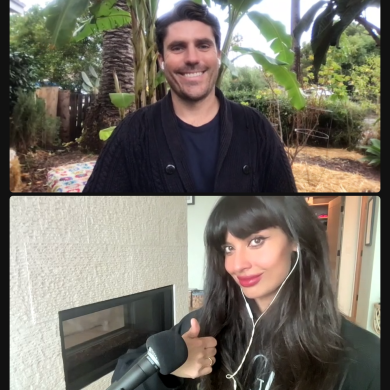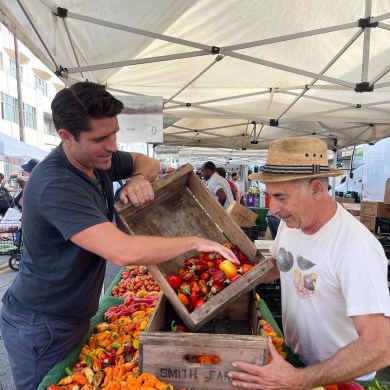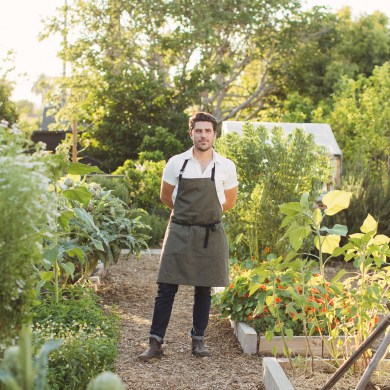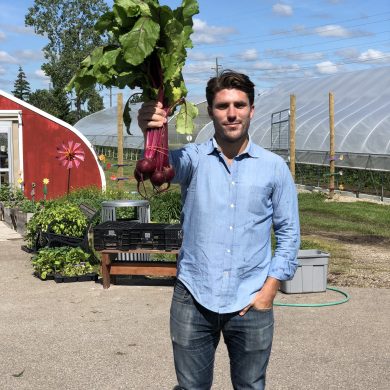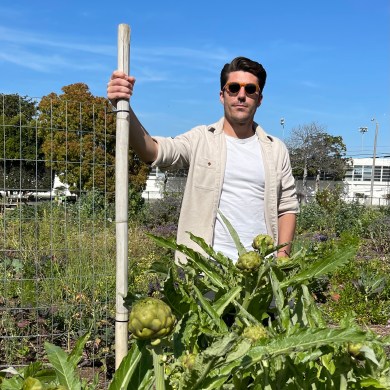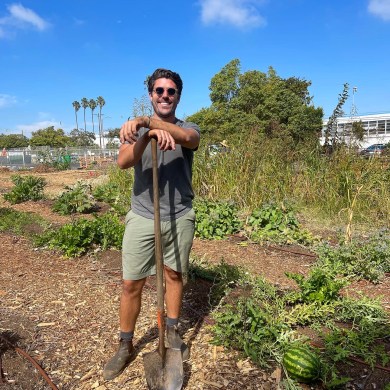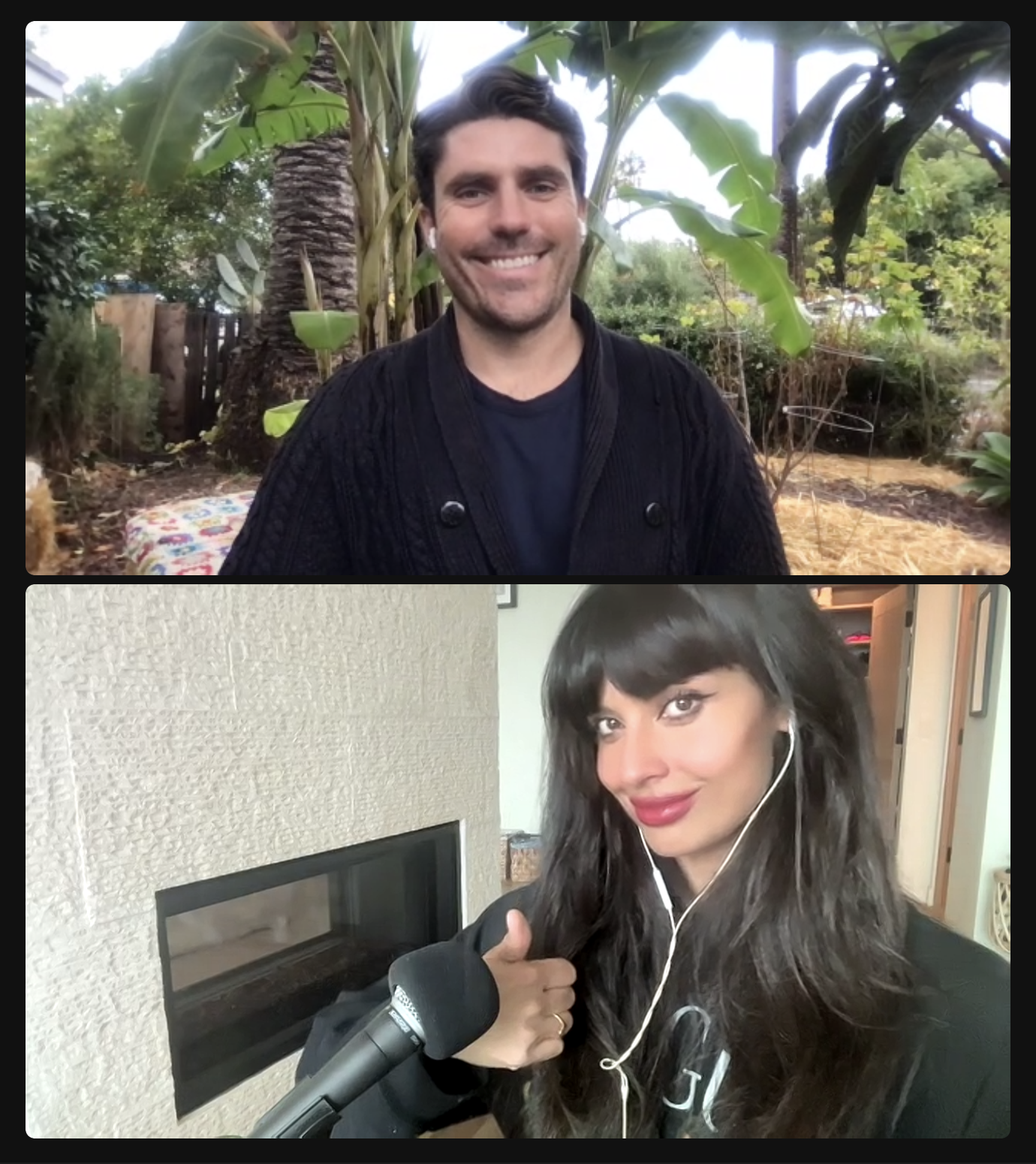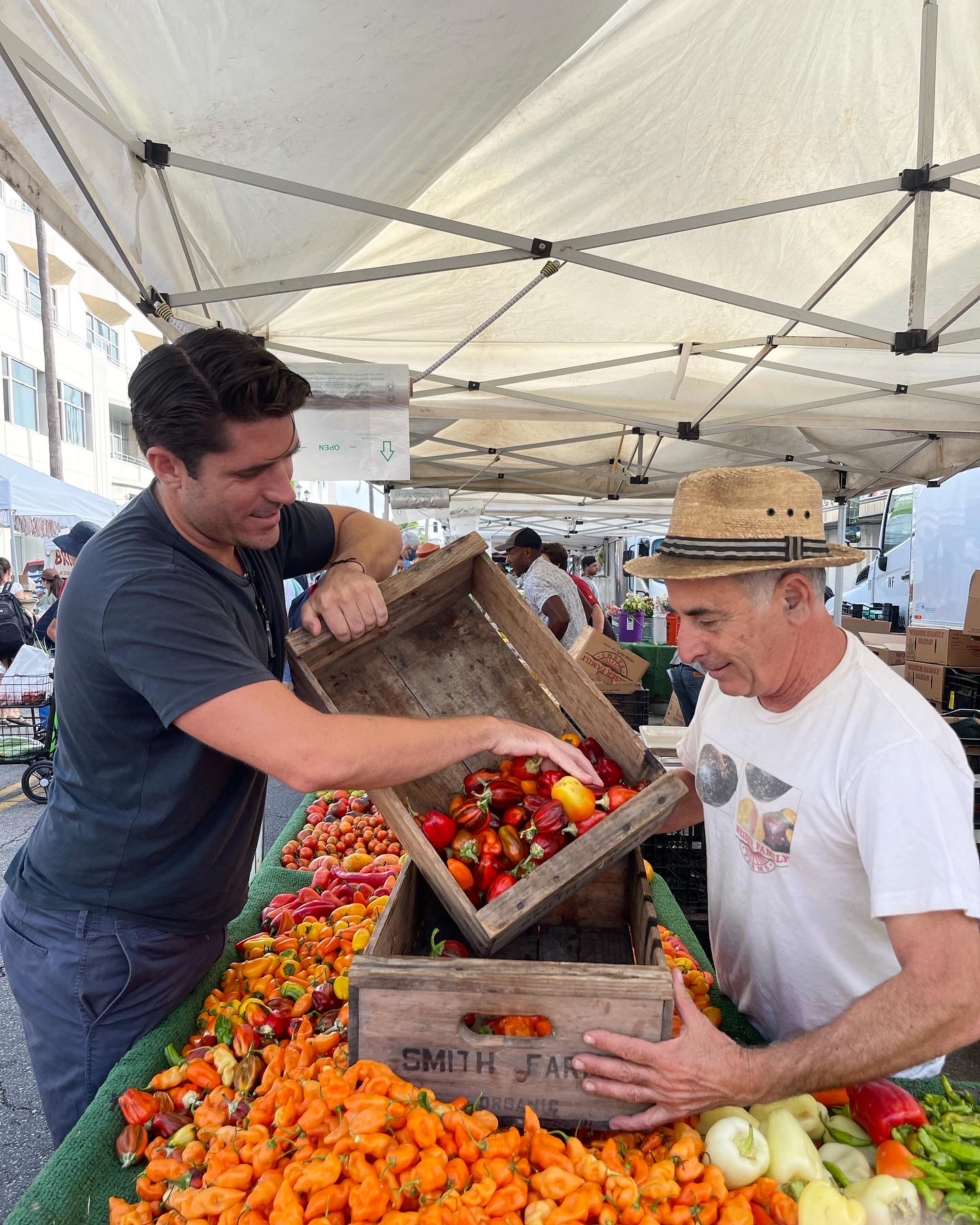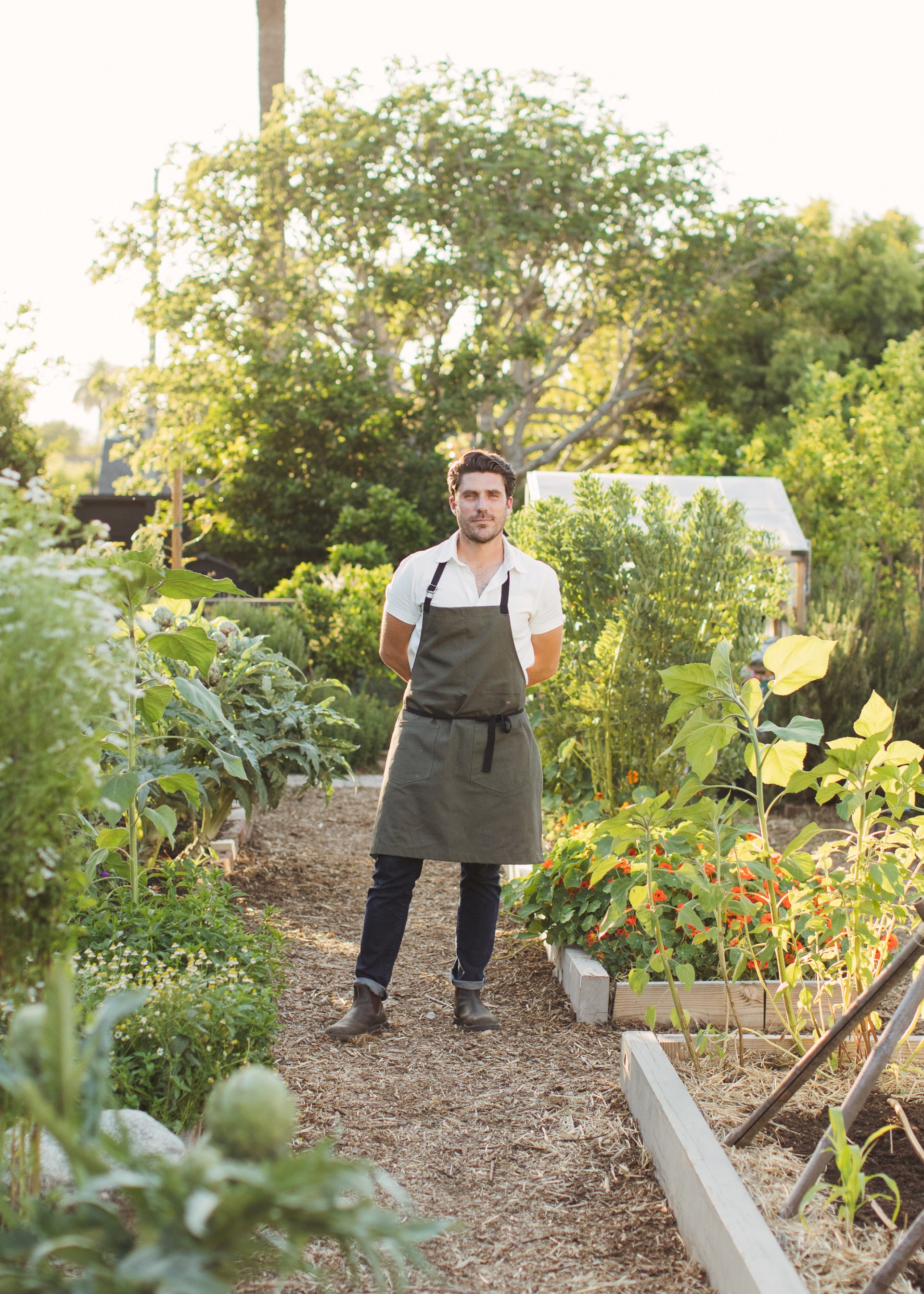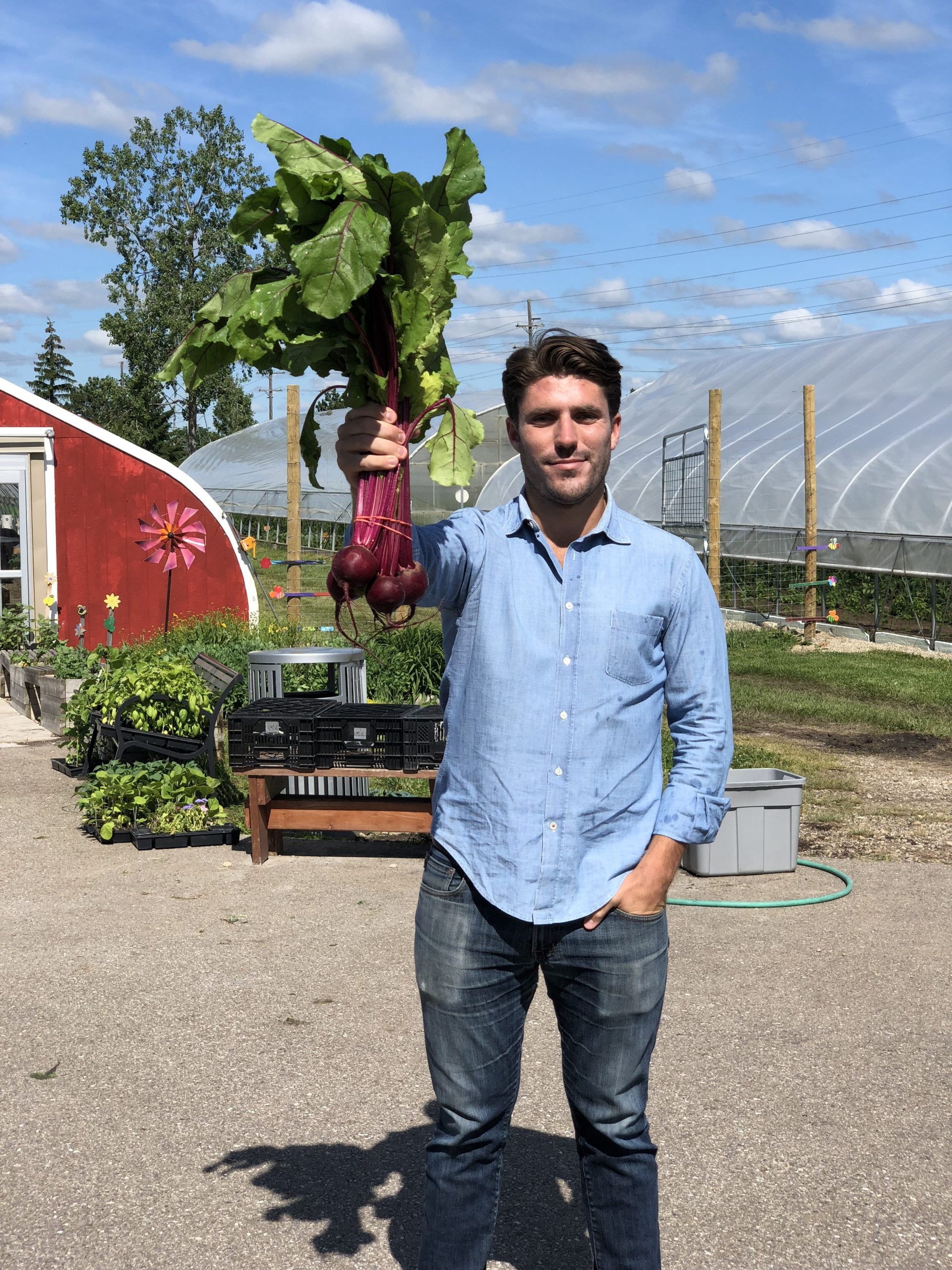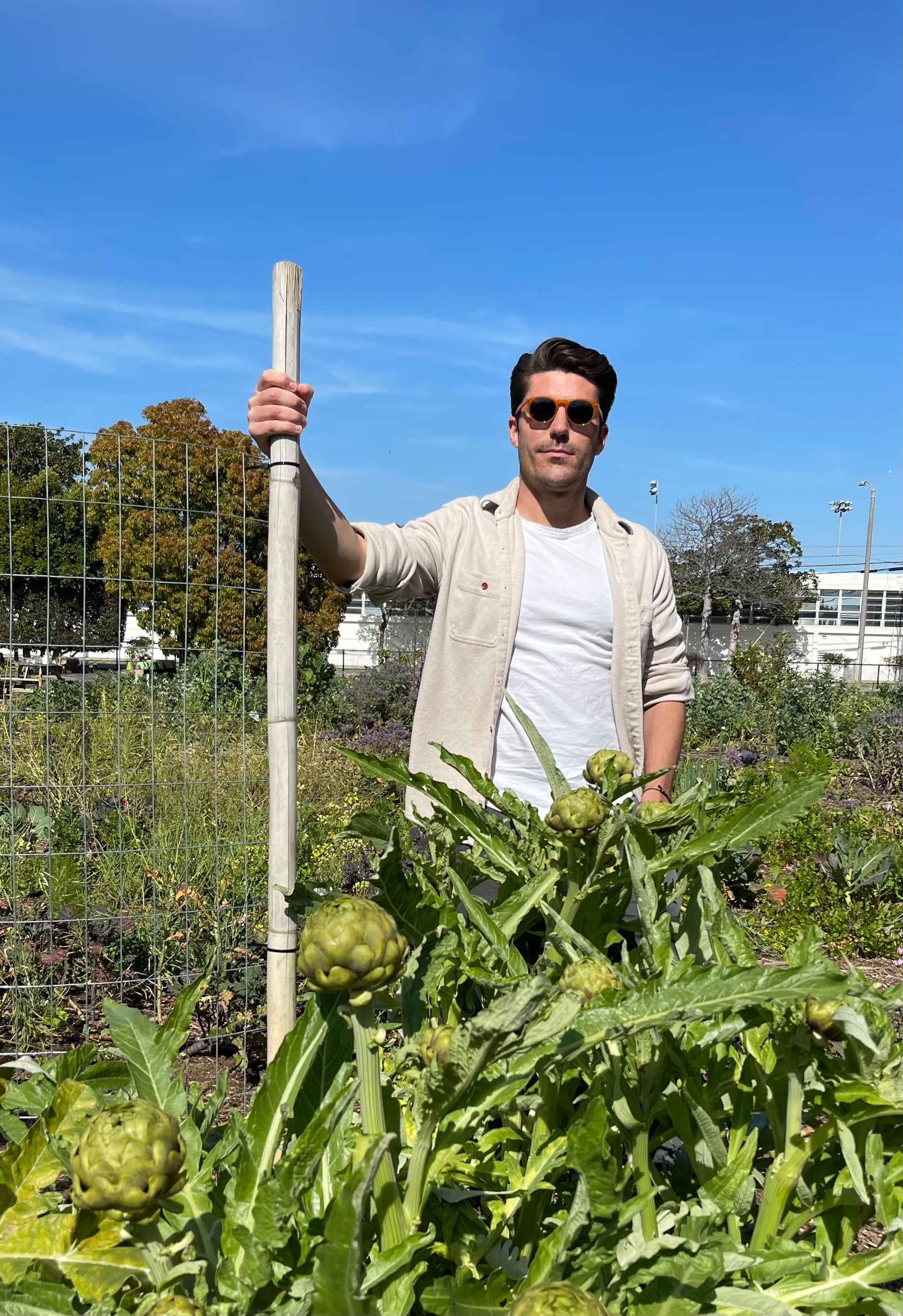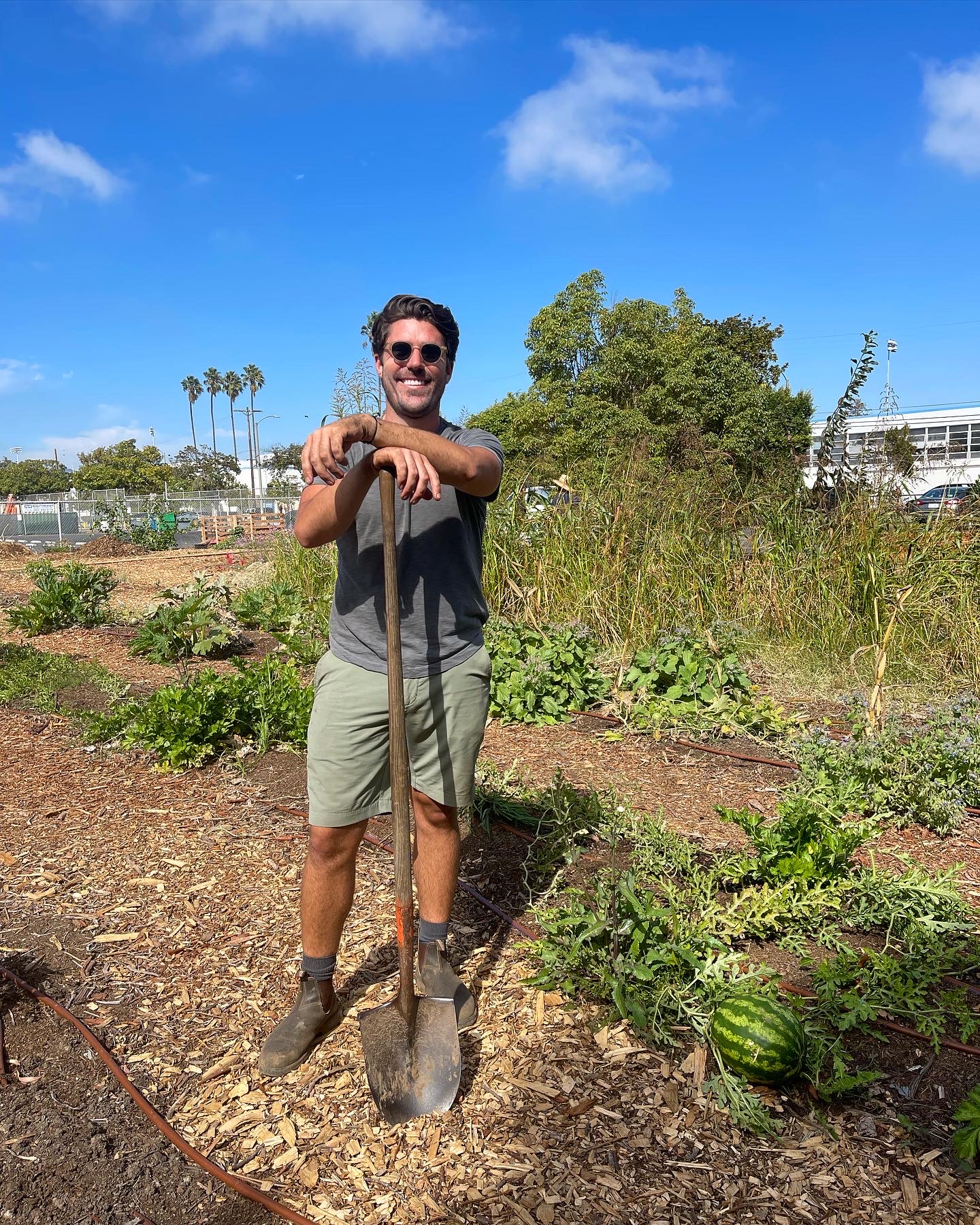January 22, 2024
EP. 198 — Revolutionizing Food Systems with Oliver English
This week, Jameela is joined by filmmaker Oliver English to hear about the people and stories behind his eye-opening documentary, ‘Feeding Tomorrow’. Together they explore where our food comes from, dig into the transformative power of food in every aspect of our lives and ask why it is important to consider the quality of food when it comes to our physical and mental health. They talk about the history of modern farming and pesticides, some myths about processed foods, and what changes we can take now to make sure our food sources are sustainable. Please note this episode covers food and food systems and not food restrictions or diet culture.
Feeding Tomorrow is out now and you can find screenings on their website: www.feedingtomorrowfilms.com
Follow Oliver English on IG @oliver_english and Feeding Tomorrow on IG @feedingtomorrow
If you have a question for Jameela, email it to iweighpodcast@gmail.com, and we may ask it in a future episode!
You can find transcripts from the show on the Earwolf website
I Weigh has amazing merch – check it out at podswag.com
Send what you ‘weigh’ to iweighpodcast@gmail.com
Jameela is on Instagram @jameelajamil and TikTok @jameelajamil
And make sure to check out I Weigh’s Instagram, Youtube and TikTok for more!
Transcript
Jameela Intro Hello and welcome to another episode of I Weigh with Jameela Jamil, a podcast against shame. I would like to just give you a little heads up that today’s episode is not not intense. We are talking about the state of food, especially in the United States, but also kind of all around the world. Now, this is a subject I have become increasingly interested in, not in a kind of diet culture-y way. I’m super sensitive to the fact that God knows we don’t need to think about more reasons why we should be restrictive around food, especially those of us who’ve struggled with eating disorders. But there are also some reasonable conversations to be had about the quality of the food we have. No one’s saying that we should deny ourselves, but are there better ways to source our food? Are there better ways to prepare our food? Do we need to be a bit more mindful of processed food and foods that are cooked in restaurants? Do we need to start to kind of prepare ourselves for the fact that the food industry, especially in places like America and even the UK, are in a little bit of trouble? So my guest this week is Oliver English, and he is a filmmaker, a chef and an advocate. He comes from a family of chefs and really, really knows his shit about food. And in this episode, he takes me through the history of pesticides and agriculture and meat farming and breaks down what currently isn’t working about our incredibly unsustainable system. And to just reassure you, he’s also very hopeful and that he lays out some very helpful and pragmatic and practical ways in which the United States and the UK and other countries who are struggling can build their way back before it’s too late. It’s just an interesting listen. If you are someone like me who struggles with digestive issues and doesn’t always know why, and tends to feel like your body is just persecuting you, this episode is, in my opinion, quite reassuring because it kind of reminds us that, maybe the government aren’t always looking out for our best interests when it comes to our health and our nutrition, and I don’t think this is a, I don’t think this is a controversial subject and maybe, maybe five years ago, people would have thought I was a bit of a quack for even having this conversation, for even indulging in the subject. But I think now we are readier than ever to accept that something’s a bit off in the fact that the United States has such different health outcomes than many countries around the world, especially places like Europe, where they take the quality of food very, very seriously. So I hope you enjoy it. I hope you watch his documentary, Feeding Tomorrow. It’s out now. I found it so enlightening and illuminating, and it didn’t make me feel as much afraid as it did, I think emboldened and empowered to take control back of my own health. And I can say that since I’ve been on this journey myself, it has dramatically improved my life. And I’m not eating less. I’m not eating less burgers or less chips or less pizza. I’m just learning how to make these things myself and being more careful about where I source the ingredients, so lots of love and I hope you enjoy the lovely and charming Oliver English.
Jameela Oliver English, hello, welcome to I Weigh. How are you?
Oliver I’m fantastic, Jameela. Thank you so much for having me. How are you today?
Jameela Intro I’m good, I’m good. I’m excited. I’m excited to have this conversation. Before, we get into the general subjects of how it all ties to us and our well-being, can I just ask you to tell people what this documentary is and how you came about the idea?
Oliver Absolutely, so thank you so much again for having me, and I appreciate your perspective on the interconnectedness of all of this. And it is so true, and it was learning more about our food and our food system and where food comes from that allowed me to kind of begin to understand how interconnected all of these different aspects of our lives really are. I grew up and I came about this work through the lens of the restaurant business, and my parents were chefs, and my brother and I grew up in the restaurant business, along with our sister, who’s also a chef now. And I spent many years designing, developing and opening restaurants in different parts of the world. And about five, six years ago, I was living and working in Abu Dhabi to open a new restaurant, sitting at the bar one night, and I looked at all this food that I ordered and it was big steak, potatoes, side salad, all this food. I looked down at certain point and I said, “Wait a minute. Where do all this food come from? How did it get here?”
Jameela Were you…on mushrooms?
Oliver I was not, hah, not at the time.
Jameela Okay.
Oliver But it was, it was one of these, I was so far away in such a faraway place in the world, and it was the first time that I asked questions where’s the food came from. And I and I ended up having a conversation with my chef about where all these different ingredients came from. It was, you know, over ten ingredients from over six countries. And I realized in that moment that despite growing up in the restaurant business, having parents who were chefs, etc., I never really asked the question where does food come from. I never thought that it may have a bigger environmental or impact on our health. And if someone like me, who grew up in the restaurant business was so disconnected, maybe there were other people in our society who are disconnected from food and the food system or where it comes from. And that led me to start to meet with farmers and was just amazed by these people who are the stewards of our planet, who are so incredibly passionate about health and soil and well-being and producing food that thought more people needed to be farmers. My brother was a filmmaker at the New York Film Academy and suggested that we start filming interviews with them and we, one by one, started filming interviews with farmers but then other innovators, creating positive change in our food system, from nutritionists to chefs to educators to farms to entrepreneurs working on how do we create a healthier, more equitable food system where more people have access to more healthy food? And that was the beginning of Feeding Tomorrow, a journey six years ago that kind of brought us to this point.
Jameela I think is really important to have that realization. And it is funny how it’s kind of only happening now, sort of not long after the Covid pandemic, I think, has made us more health conscious and made a lot more people aware of our nutrition and what we can do to generally protect ourselves. Food is something that I’ve shied away from talking about until the last year of this podcast because, you know, with diet culture being so pervasive, I think there’s been a kind of movement against diet culture to not think about food and not be fear mongered about food and not think about what’s going into our bodies because we are trying to reject diet culture and we’re trying to stay away from orthorexia, which is a kind of fear of food, which I think a lot of us who’ve been immersed in diet culture have also struggled with. And so it’s something that I very much so buried my head in the sand about for such a long time, but now it feels like there is a way to have this conversation that doesn’t mean restricting what is going into our bodies, it just means finding an alternative source to have the same foods. You don’t have to go on some sort of completely restrictive diet, you don’t have to be completely plant based only, etc. You don’t have to go to extremes. I think there’s so much extremism in our generation, and really what you’re encouraging in this documentary is just knowing the source and considering the source and being more hands on with your own nutrition, which I think is so incredibly vital. And so can you talk to me about one of the biggest revelations you had from the documentary?
Oliver I think it’s the simplicity of the rules of health that really we should look to guide us. And I think so long, for so long in this country the narrative, particularly around health, has been about what you can’t have or what you should not have. And it’s been very fear based and been very restrictive. What should I not have on the plate? What should I not have on the plate? I think that is not a, it’s not a really a positive place to come from, especially when it comes to nourishing your body. And what we’re trying to talk about in the film is and this is backed up by Lisa, the main nutritionist in the film who does some incredible work, which you have to go see the film to find out. But she talks a lot about blue Zones, and her sort of philosophy is, let’s not talk about what we should not have on our plate. Let’s talk about what we should put on our plate more of. And she basically talks about, there’s all these different diets around the world, you know, everyone says more of this, more or that, less this, less that, etc. but everyone agrees that getting more whole food plants is one of the best things that you can do. And so let’s talk about sourcing locally. Let’s talk about going to the farmer’s market. Let’s talk about having whole food plants at the center of your plate. Does it, that doesn’t mean that you need to be a hardcore vegan, or you need to be a part of this or that. Everyone’s body’s different. Everyone’s going to find a balance that works for them yhat is better. But what we do know from the film is that the food that comes from the healthiest small, like small, organic, nutrient dense farms is the food that is the most nutrient dense is going to help fuel you both physically and also mentally and spiritually too. But really it’s that shift in perspective from how do we do more good and how do we put more healthy things on our plate. And when we put the healthiest food on our plate, we’re actually putting the most sustainable food on our plate as well.
Jameela Yeah. And when you talk about healthy, I think, again, that word has become so bastardized because of diet culture and wellness culture so people then presume it means just one type of food group. What I got from this was like the staggering realization that I can’t anymore ignore what is going into my potato chips, or even the healthiest of the healthy vegetables or the healthiest of the salads. It doesn’t really matter to much of an extent if your food is covered in chemicals. And it was the kind of, it was the chemical element of your documentary that had a huge impact on me and, and made me think about the history of pesticides. It’s not, it’s something that’s so part of everything I’ve ever known because I’m of a generation that never knew food that wasn’t covered in this sort of in, in these chemicals to get rid of weeds or get rid of pests, etc.. And so I didn’t know about the history of it. And I think it’s really fascinating the time in which it occurred. Can you break that down for everyone?
Oliver I think this is one of the most important conversations that we need to be having as a generation, quite frankly, is are we okay with this incredible mass quantity of toxic chemicals in and around our food system? And what are the short and long term implications to the health of humanity? So the the mechanisms and the scale and the chemicals that were designed during World War II, largely Agent Orange and chemicals that were used in Vietnam and used as spray on, you know, enemy combatants that we used to drop from airplanes and spray, these types of chemicals got reintroduced and repurposed into agrochemicals for agriculture. Basically, the entire military industrial complex switched from making planes and trains and boats to making agricultural equipment and all of those companies that were making the chemicals and the bombs to drop on enemies, napalm, all this horrible stuff that is not used anymore in the world or outlawed in many parts of the world, they transitioned to become the backbone of the chemical companies that then helped fuel much of the food growth and the food production systems in the United States for the last several decades, and then also inspired many parts of the world to then do the same. So we have been infiltrating our food system at all levels with huge amounts of toxic chemicals, for decades. And it has shown, and what is I think really positive is if we decide to, as a culture, as a society, as the world say, we know that this is bad, we don’t want to do this anymore, there is a better way to do things that is already working. And we talk about this in the film as well. And we talk about examples of the regenerative holistic farming that does not require chemicals, that doesn’t require pesticides. The transition to that type of farming that we need to move to, and that’s what we’re talking about. So we need to have this fundamental conversation about the real impacts on our food system. And I think we need to decide as a generation like this is, this is bullshit, excuse me. And we don’t want this. We don’t want this for our bodies. We don’t want this for our health. We certainly don’t want, you know, to give this food to our children. And if we want to have better mental health outcomes, you know, physical health, environmental health outcomes, we need to take a hard look at the food system. And the agrochemicals are a significant part of what we really need to take a look at there.
Jameela So something I was wondering when I was watching the documentary is, was it just because they had all this chemical left over from the war that they wanted to be able to repurpose it and make money from it? I know that it was also able to, you know, via the petroleum, it was able to, you know, have an impact on the soil that then meant that it was, you know, technically good for creating more produce. But what the fuck were they thinking?
Oliver Yeah, it was, honestly, I think a lot of this stuff was done, you know, these people didn’t go out to say, “Oh, we want to totally harm and screw everyone over.”
Jameela No, I’m sure.
Oliver I think at the time they were responding to, in many cases, the just the serious needs of we have a lot of people and a lot of people are going to starve unless we figure out how to feed a lot of people. And this was around the time when sort of the Green Revolution was happening. And during World War II is also kind of around the time when they figured out how to, how to create sort of chemical based fertilizers and pesticides. The Green Revolution is essentially when the large scale industrialization of agriculture started and they said, we are going to grow small amount of crops, corn and wheat, and we’re going to do it in this chemical model. And so it was this kind of, all of this kind of started to shift at once, put this post-World War II industrialization with demographic trends and there being a huge population boom, and people saying, “Oh, we have this technology, we now have all these chemicals, we have a huge population boom, we got to fix this now.” And I don’t think they meant to destroy the world necessarily, but what happened there has gone unquestioned for decades, and it’s gotten so much worse. And I believe now we are at the place where we have seen the negative impacts. We know that it is not good and we know that it’s going to get worse. We also know that we have solutions and a better way to do things. So we need to have a collective shift in awareness, in excitement, in passion. And that’s why we made this film. One of the reasons we made this film, that’s why I think our generation, it’s up to us to say we want to do things differently for, for for our for our friends, for our family and for the next generation. And it’s as simple as deciding we want to go support this farm that’s not using chemicals versus that farm, you know, at all levels of the food system. It’s also starting to rain, so I’m going to go inside.
Jameela All right hahaha.
Oliver Which is great for the plant. So I’m very happy from the inside.
Jameela You are encouraging people also to get involved in farming themselves or even in their local building, like coming together as a community and starting to create community projects together, where people start to get children, introduce children to farming, like bringing that into the schools. And when I say farming, I mean, like, you know, planting. We’re not having children let tractors and stuff, but but being able to actually learn how to plant seeds and look after them and grow their own produce and start to develop a real respect and understanding of this huge relationship between us and nutrition and us and food that comes from the earth. For someone who’s listening to this, what is some advice that you would have for being able to take this into your own hands? Like do you plant your own food? Do you grow your own food?
Oliver I do now, actually. That’s why I was sitting on the garden. I was kind of asking to show you and now it’s raining, but, you know. Absolutely. And I think one thing that we learned and part of that, my own self-discovery and kind of figuring out where I was, who was connected, was we asked all of these experts in the film, you know, climate scientists, nutritionists, educators, policymakers, farmers, etc. how do we, you know, ensure that the next generation is better equipped to deal with these issues and understands where food comes from? And all of them said to us, you have to connect kids to food at a young age, and the best way to do that is with school farms and school gardens, etc. and it sounds like obvious and that now I know it to be obvious. But it is powerful. I will, I’ll give you two quick examples. One we turn our front yard or front yard. I can send you some photos as well. I turn our front yard from a regular lawn into a mini food forest. And it’s now growing different types of, herbs, food, a bunch of, perennial plants. It’s a native pollinator habitat as butterflies, artichokes. It is such a wonderful place to go out and spend. Times totally change my relationship with the food. And it’s changed our whole relationship with our neighborhood. We simply talked to a couple people on our street, but since we started growing our garden, it’s opened up a whole new connection with multiple different people in our neighborhood who we never would have spoken to before. So that’s really sweet. Well, it’s a gamble.
Jameela Once again.
Oliver It’s a gamble for sure. And it’s fair is fair.
Jameela But the most I’m very, friendly, English. But yeah.
Oliver Fair. The most important part was during Covid, we started a regenerative school farm at a public middle school here in Santa Monica. And we got to teach the principal together a couple people from the school and said, all these people in the film say that. How do we how do we deal with the health issue, the climate issue, and sort of social equity issues? And we have to connect kids back to food and farming. So we built a school farm, a regenerative school farm. Every single kid has 1 to 2 classes out on that farm a week. And we’ve had parents who come to us and say, thank you so much. My child never used to eat kale. Now they love kale. Couldn’t get my kid any tomatoes. Now they love tomatoes. And by the way, here’s the post. The principal told me recently that any time a kid is acting up or whatever, they send them out to the farm, they run around a little bit, they stomp around and they’re in a much better place. And also, one of the main women, or one of the women from the film talks about this, that schools, the school gardens, have a better academic and mental health output.
Jameela What’s the link though?
Oliver I don’t know exactly, but I imagine that it would have to do with spending time outside connected to plants and gardening is it is known to calm you down, calm anxiety. If you’re familiar with the concept of forest bathing, the Japanese popularized forest bathing. This is kind of like micro forest bathing. It’s kind of like, you know, for these kids, these plants are quite big. So just spending some time outside in amongst the plants, you know, not not inside with fluorescent lighting and, you know, kind of a, you know, institutional feel. Being outside connected to plants is very calming.
Jameela It’s also gratifying. It’s also gratifying to see the fruits of your labor, like the literal fruit trees.
Oliver Exactly. So what work where we’re encouraging is you don’t have to go start a school farm, I get that, but if you have a little piece of land in your front yard, if you have a patio inside of your house, you can plant something, you can plant some basil, you can plant some sunflowers. And what we learn from all of these farmers is all of these actions are profoundly impactful. And what we’re trying to encourage in the film is let’s not look at the climate problem and health problem and all the ailments society face today, of which there are many, believe me. And I know you know that as well. But how do we look at the positive impact that we can have environmentally from a health perspective, from a societal perspective, through our food system? And there’s small things that we can do in our daily lives to help be part of a more sustainable future in a way that puts our own sort of physical and mental health at the center. And in so doing, I think we can enhance environmental and communal health as well. So we talk about going to the farmer’s market. So cooking some meals, which is good whole food ingredients, getting involved in a composting program, some planting some food and flowers, you know, in a in a small way, does have a very big impact. You’re sequestering carbon, you’re building pollinator habitat. And it’s a it’s a reminder that I think we are connected to this whole. System. We are deeply interconnected to the natural world and the natural system. We’ve become disconnected from that reality, and I think food and the food system are one of the most powerful, beautiful and delicious ways that we can reconnect with that truth.
Jameela Yeah. Something I keep noticing that I’m struggling with in my brain every time I want to ask you another question about this is that my brain goes, please, like people are just going to think this is a fucking waste of time, that I have time to fucking plant anything that going to have time to grow there. And vegetables. People don’t have enough space to grow their own vegetables. There’s like this, this voice in my head that keeps like beating me down. That’s just going like, well, I mean, people aren’t going to prioritize that in schools. Like, why are people supposed to care? Like they’ve got more important shit to get on with. And yet there is the the new understanding of all of this that I’ve come to reckon with in the last year, because I’ve had health issues that have been massively resolved by changing, you know, the way that I eat especially, and the chemicals that are in my food, there is almost no greater investment into your time. There is because because it’s so linked to our health, because it’s so linked to our well-being, and it has been turned into this frivolous thing that you do on the go or while you’re watching TV. There’s no, like, real thoughtful ness around it. And we are a culture that are not encouraged to do things with our hands, like be involved in agriculture. It’s not considered a glamorous or cool or noble, you know, thing. It’s it’s it’s just been so hyper normalized for us to just not think of it as a central, central foundation of our longevity and our well-being. And, you know, you’ve kind of hinted a few times that this is sort of by design and it, you know, it’s been turned into fast food, convenient. It’s something that’s just a tiny little part of your day so you can get on with fuel use, you can get on with the real the real life you’re supposed to live. Whereas I’ve spent so much time in other like, I grew up partially in Spain, where food is a central fucking part of of how you spend time with your loved ones. It’s how you show love. It’s how you receive love. It’s like three hour meals, like go to fucking Greece. You’re not getting out of that restaurant within four hours. You know, they really take their time and they really make the most of it. And they’re relaxed when they eat. And it’s it’s a beautiful ceremonial thing. And that just doesn’t really exist here. Like there aren’t even dining tables in a lot of the homes that I’ve, you know, seen growing up in London or, you know, New York or Los Angeles, it’s just not prioritized. We all ate around the TV or standing up in the kitchen or running on our way to school. It just isn’t something that is, made important in the United Kingdom, in the US and. That feels very disturbing. And so I appreciate you talking about this, but I think I also wanted to call that out to anyone who’s just like, it’s fucking January and I’ve got shit to do. I don’t want to talk about planting stuff. We have to. And and I like the fact that you are not calling for anything completely radical. You’re just saying everyone can take a step towards this change now. Now, one of the things that you know, you touch on fairly early on in the documentary is the ramifications of if we don’t take these steps not only as individuals but as a society to alter the course of farming. Can we get into that? Because I think that’s incredibly important and something that a lot of people who listen to this podcast, something that they care about, is our environment and our world. Can you talk about what happens if we continue on this trajectory of hugely industrialized farming, like how much of the land in America goes towards agriculture?
Oliver Sure. So a little bit under half of the arable land in the country goes to agriculture. And I think one of the most important stats to think about this is in 2015, the United Nations came out and said that we have 60 years of harvests left. Today we have 53. And basically that means that based on our current in large scale industrial agricultural practices, if we go with the continue to go with the rate that we’re going at, we will be able to have 52 or 53 more years of harvesting food. So look, let me let’s let’s just take that in for a moment. That’s within our lifetime. Okay. Yeah. Yeah. That is not, a ha ha. Like, let’s just laugh that off, stat. What that means is we have converted so much of our agriculturally growing land to, industrial, agricultural methods that we are making our soil so fragile at such a large scale that it is now susceptible to wind and soil erosion. So if we continue to go with the pace that we’re going, and it’s getting worse every year, we will not be able to grow food in 53 years, which is in our lifetime, which is terrifying. The large scale industrial meat complex is horrifying. We try to talk about in the film the nuance between CAFOs concentrate animal beef operations, feeding operations and regenerative meat. You know, the first being really horrible and the second being kind of what we need. But what we’re looking at in terms of the current industrial agricultural model is large scale, land desolation, the destruction of large amounts of forests. Huge amounts of destruction of biodiversity, largely because of pesticides and infiltration of toxic chemicals into our environment, our air and our water. So if we continue to go with the rate that we’re going, we’re headed for trouble. And I would also add that climate change is making all of this significantly more worse. And in addition to working on the film, we run a production company, where we work with farmers and NGOs and non-profits all over the world to tell stories about food and farming. We’ve interviewed over 60 farmers all around the world, and the story is exactly the same all around the world. Extreme weather is here today to stay. A climate change is not this thing. Ten years. You know, the future. They’re getting incredible amounts of, heat and dry weather and then no water, and then huge delusions of rain. So the weather patterns all around the world are already more predictable, which make a fragile system dependent on industrial agriculture very, very susceptible to a shock to the system. The shock to the system could be a pandemic, as we saw a shock to the system. Could be the war in Ukraine. Shock to the system could be another armed conflict. And when we have multiple shocks to the system around the world, the system is very vulnerable. So I’d say the main thing right now is that the food system produces a lot of food, of which we waste a lot, but it’s incredibly vulnerable, incredibly vulnerable. We saw what happened during the pandemic. We saw what happened during the war in Ukraine, which is, you know, totally changing, fertilizer prices all around the world and changing food supplies, particularly to Africa. So right now, it is a very precarious situation. We are, you know, just a little bit 100 years ago was the dustbowl, which we talk about in the film, which is a very famous part of American history, when huge parts of the western part of the United States were sort of uninhabitable for farming because of farming practices. I don’t think another one of those is far, far out of the question. So we’re on a very negative trajectory if we continue the large scale agricultural practices. That being said, we also have a really, really positive path forward, and we have so many solutions that are already working. Right now it’s about the large scale a. Option and transition and scaling of those solutions. But there is no question that if we continue blindly to go down the path that we’re currently going, it’s going to come to a head and eventually there will be huge food shortages. Huge part of the world won’t have food. It has a lot of, interconnected challenges climate change, food shortage, migration, conflict. All of these things are connected.
Jameela Yeah. 20 to 30% of our greenhouse emissions come from the food system.
Oliver Correct. So it’s actually it plays a significant role in in terms of the problem. But the food system can and should be a carbon neutral part of the world. And it can be through the large scale transition to regenerative agriculture and agroforestry systems. These are farming systems that we talk about in the film that are the way of the future. And it takes lessons from the past agroecological ways of growing farming, where you have multiple different types of animals and trees and plants, and working together in a system where you don’t have chemicals that come from far away. The fertility comes from the compost, from the farm, or from the animals that are on the farm. And you’re building soil health, you’re sequestering carbon, you’re helping to improve biodiversity on the farm through time as you go. And you’re also sequestering carbon so that 20 to 30% can, in the next 50 years, become a carbon sink if we decide to do it. And it can have a net positive impact on the future of food. And by the way, the food that’s coming from these most sustainable farming systems is the food that is providing us nutrient dense, healthy food that is going to heal us both, I think physically and and mentally as well.
Jameela One of the more harrowing moments of the documentary was when we had a doctor who works in a hospital at a very high level, whose own father, you know, I think was diagnosed with pancreatic cancer. And, you know, there’s a very, very, very small percentage of surviving people who actually go on to survive that beyond five years. And it was only when her own father was now being treated in the hospital that she actually started to reconsider what it was that they were feeding him in that hospital, and generally what his diet consisted of, and that she suddenly had to deal with the kind of moral reckoning of she’s been allowing all of her patients to consume what they’re giving in the hospital, but she’s now secretly kind of going off to Whole Foods to get food for her father, which is the kind of moment that I think a lot of doctors, at some point, I imagine, have to reckon with, which is that, you know, it’s it’s it’s not in medical school and nutrition is not a big part of, if at all, a part of, of your learning to be a doctor. And yet, deep down, instinctively, it’s impossible for practitioners to not consider that there is some sort of link between the increased chemical input into our produce and the increased level of disease in this country versus other countries that don’t allow those chemicals. And I thought it was really cool that she admitted that that like, she’s you know, it’s one rule for everyone else and another rule for her own family. And that’s when she decided to make a change and start to apply this to her general health care and to the hospital’s general practice. But it really does make the point in that moment in a very legitimized way, because so often you see doctors also like fighting back against the idea that food is responsible for illness. And to have a doctor say, I wouldn’t give this shit to my own family was very poignant to me. And so can we go a little further into exactly what you believe the links to be between the chemicals that are in our food and also the antibiotics. That’s something I think we still don’t have a mainstream understanding of. You know, that with the antibiotics that we put into the meat.
Oliver Absolutely. And Lisey’s Story is incredibly powerful. I think it shows you that even at that level, it takes an it kind of an insane story with your own family member for you to have a reckoning. And I think what we try, what we’re really hoping to do with this film as well, is hopefully this film can be someone’s reckoning or they can just, you know, spark something for someone or make them realize that, oh, I remember I have a family member who survived cancer or who got cancer or had some health ailment. You know, there I think we are all ready and we are, if we haven’t already. We are all, you know, capable of having that moment of, oh my gosh, that moment of reckoning. And from what we’ve learned about from the film and from Lisa is, you know, our our bodies are sort of predisposed to certain things, you know, to certain diseases or certain or to be not disposed to certain diseases. And we have certain genes and basically food and food and different micronutrients from different, produce in different types of food can sort of turn genes and turn genes on or turn genes off. And so we know that at least from, from what we’ve heard from the film, that huge amounts of chemicals, particularly glyphosate. Turns off some of these receptors, it actually decreases the ability for food to be, you know, healing. You know, everyone’s heard the phrase let food be that medicine. And this was true for history, you know, societies and cultures and people from Asia to Europe, South America, all over the world, food has been medicine and still is in many parts of the world. And we’ve gotten really far away from that and what these chemicals do. I’m not a scientist, but from what I know from the film, a lot of what these chemicals do is they prevent food from being that medicine in many ways, and actually help bring on disease. So we need to to kind of have, I think, a reckoning of, do we want our food to make us sick or do we want our food to help heal us? And it’s one tomato or two tomato from two different farms can have a very, very big impact on your disease, your state of disease or on your state of healing. And so a lot of the food that is highly processed, that is, you know, you get that, you get at the, you know, the corner store or, you know, fast food restaurant, a lot of food that’s made with cheap products. It has a lot of calories, but not a lot of nutrients. That food is not providing you any really health benefits. There’s no micronutrients there. It’s giving you a lot of calories and fat and might give you that little, you know, that little.
Jameela Dopamine.
Oliver Dopamine for the moment. But you’re going to be hungry again in 30 minutes. And because it doesn’t have any micronutrients. So I think that there is and I want to look more into this honestly. But I’ve seen and I believe there to be a huge impact between the quality of the nutrients and the food that we are eating and our own physical health, and then by by extension, our own mental health. And I think there’s a whole dock to just be had, just looks a little bit more closely at that. But from everything that we’ve seen, it’s tremendously positive. And all of that goes back to the health of the soil. You know, we’ve learned from the film that that’s what the key okay.
Jameela What is glyphosate in? I almost I want to ask you that question.
Oliver Glyphosate is the main compound in roundup, but now it’s been taken off. What’s roundup? Label roundup is basically the most is one of the most widely used agrochemicals in the world. So basically, we talk about this in the film. You know, we are pouring huge, huge, huge amounts of these agrochemicals into our soils and into, into the plants themselves all around the world. And so they just, like, disappear. They make their way into the food, they make their way into the soil, they make their in the water system. And, some folks at, moms across America, which is an organization, have been doing some testing, actually, where they test, you know, fast food restaurants. And they tested the top 20 fast food restaurants and found basically traces of glyphosate in, like, whatever, 80% of it. So it’s really in, in, in everything in many ways. And the way that you avoid it is by supporting the types of farms that don’t use it.
Jameela And the wait, wait wait wait wait wait wait wait wait, is it in sort of fake milks. So for example like so he’s saying it’s a, it’s a in like parcel of oat milk and all of that sort of thing.
Oliver I don’t, I don’t know that I can say for sure what it is then and what it’s not. And what I can say is anytime you have a large scale like corn, soy, wheat farm, anytime you drive through the Midwest, these big farms, they are likely using quite facility in their operation. So any product that’s going to come from one of those farms, the chances of having glyphosate are much higher. So anything that’s processed, anything in a bag, anything that’s anything in a box or bag that is not organic is like the chances of it having glyphosate. I can’t say for sure, but likely. The what I can say is the best way to avoid that is to go to your farmer’s market to buy organic when you can. And I also understand that that is a price challenge sometimes. And that is by design. It’s not I don’t want to sit here and just say, oh, go buy everything organic, because that’s also not.
Jameela Realistic.
Oliver Financially feasible for myself and for a lot of people. And that’s by design. I would also add that the reason that that is the case is because we, the taxpayers in the United States, spend hundreds and hundreds of millions of dollars, $1 billion a year on federal farm subsidies to make the corn, soy and wheat products artificially cheaper. So our taxpayer dollars are artificially decreasing the price of all of the cheap processed foods. That’s why the burger, you know, fast food place is less expensive than a lot of the produce at the farmers market. So the taxpayer money is currently making the cheap, unhealthy food less available, which is why it’s consumed at a greater rate, which is why it’s impacting health outcomes in a negative stance. And so it is difficult right now to say go buy the organic thing. But when you can’t, if you can, it does matter. And there are certain things that, are better, you know, anything that if you have to kind of pick and choose anything that you’re going to eat readily, like a blueberry or a raspberry, always try. To make them do that organic when you can. Things are not as bad. I guess we’d be like avocados or bananas, but I would say if you can, when you can try to do organics, that means that there’s no chemicals or minimal chemicals on that, on that. But yeah.
Jameela Also the term organic now gets thrown around very loosely. So speaking of fake milks etc., can you talk to me about veganism in a country that doesn’t look after its produce? Because I found that myself and a couple of my friends tried to go completely plant based here, and it turned out to not be amazing for our health. And I’m sure that’s partially down to how processed a lot of the vegan alternatives are. Can you explain some of that to me?
Oliver Sure, absolutely. First, I think it goes back to this idea of do we want to come from the place of these are all the things that I can’t have or do we want to come from the place of these are the things that I want to have more of and put at the center of my plate. And so from my own personal experience, once I started learning about the environmental impacts of meat and the water use and CAFOs and everything, I went pretty much like hard vegan for like two years. And for a while I was eating these. And it is true that the keto meat has huge, huge impacts, negative impacts on the world. Like, absolutely. But I was eating these really processed soy burgers, that I later found out with basically, you know, processed soy. You follow that back to their cutting down rainforests and Amazon to grow mono crop soy that then gets processed into these soy. Hockey puck burgers that I’m eating. You know, these double soy burgers and not feeling terribly great about it. And I think my own journey through the veganism, vegetarianism kind of more I think the Mediterranean diet now, I guess I don’t really have a exact box for it, but kind of plant forward Mediterranean. But I’m not vegan. It’s really more about sourcing. What I realized was, you know, a lot of the vegan products are highly, highly processed. And so if we’re going to have a discussion about veganism, which I don’t, I think for a lot of people it does work. And again, everybody’s body is different and everyone’s gonna come to a place that works for them. Everyone’s gonna kind of go through an evolution to find what works for them. And I think that’s totally fine. But I would just say that, you know, if we’re just assuming that everything that’s vegan is good for us is just not the case. Again, turn that label over and look at how many products are in there and how many quote unquote ingredients you recognize or couldn’t even pronounce. And if you’re eating a soy burger that you know is got 15 to 20 ingredients in it that they mono crop soy, they spray with glyphosate, is that better than the grass fed beef that came from the regenerative farm? I would argue, you know, you know, environmentally, that’s kind of where we’ve come to, you know, do we be do we need to be eating less meat? And as Americans in general. Absolutely. Do we need to be eating more plants and more plant forward food? Absolutely. You know, the blue zones around the world where people live the longest and have the happiest, healthiest lives. Show us that putting plants, the center plate, those little bits of meat and fish here and there and red wine, a great conversation. A lot of other things are key to a happy, healthy lifestyle. But I think the conversation cannot stop at, oh, this is vegan, so it’s good for me. It’s, oh, what’s going into that? And, I think what really is at the cornerstone of health is where is the food coming from, the types of farm and the level of processing. The closer you are, you can eat that food to its natural state, the better its going to be for you. And so when we’re talking about this conversation of veganism, and we also know that, you know, there’s a big difference between animals raised in the k fold model that we were talking about with all the chemicals and the pesticides that grow into to create the feed for those cattle, plus the antibiotics that you need to keep them healthy, you know, versus, that kind of system you need to get rid of completely. But we also know from regenerative agriculture that we need some types of, ruminant animals cows, sheeps, goats, chickens, involved in holistic farming systems. So it really is more then to.
Jameela Eat the produce and to be part of the whole ecosystem.
Oliver Correct.
Jameela So regenerate the land.
Oliver Precisely. And the animals are a key part of that system. On a farm they create the fertility and provide the fertility. So they don’t have to use chemicals that come from somewhere far away. So it’s really about, again, kind of asking one, you know, a couple more questions about where the food is coming from and and being okay with, going on a journey. It’s it’s a multiple year journey that we’re all evolving on and not being so hard on yourself. So you don’t need to go vegan tomorrow. You’re going to die. You know, we’re not trying to say that. I think this is an evolutionary process for all of us to kind of get back in touch with a diet and a food program that works for us. But what we do know is supporting local, supporting, seasonal, supporting whole foods and composting are some of the most profound impacts that we can all have from an environmental and health perspective.
Jameela So in that respect, we can go to our farmer’s market. We can if we want to be vegan or we want to not be vegan. Regardless, just make sure that you are sourcing whole foods that aren’t fucked with with pesticides.
Oliver It could affect fitness. Ate it better. For most e-commerce market you’re in, you’re at. You’re in good shape. Even the even the meat that comes from local farms. There is usually the best you’re going to find. If you’re going to do vegan, have whole food plants, you know, don’t have the super processed soy, whatever. Because that might be honestly, maybe worse environmentally than some types of meat. Again, regenerative or capable.
Jameela So the farts are very bad.
Oliver Exactly that. So that’s why we do these. We don’t do in-person podcasts anymore. Yeah. We have to be separated in we do be relegated to our own zoom. Zoom run.
Jameela Because you have to, like, wonder, what’s the fucking plan, America? Like, if we’ve got, what, 52 years of food left that is able to be produced in this country, we have that number probably speeding up because of the increase in climate change in that time, and the fact that 30% of the greenhouse emissions are coming from the agricultural situations, like we’re just we’re on a what feels like a like a speed train to hell. And at the while this is all happening, you have antibiotic resistance, which is when antibiotics no longer work on you, which is greatly caused because we are eating meat and cheese and milk and eggs, from animals that are pumped full of antibiotics. So it’s not even antibiotics that we are ourselves taking. So making all these people sicker in a country where healthcare is so incredibly expensive and such a ginormous part of like debt in this country and a huge cause of homelessness, whilst also this completely, literally, statistically unstable, path forward where we have less than half a century of food left and the population’s increasing and, abortion is, becoming outlawed. So there’s going to be even more humans forced into this country. I can’t imagine why this wouldn’t be a number one emergency. Like what? You’ve got billionaires building fucking bunkers underground with their food sources. It’s just like this feels more and more like a fucking horror movie. And I know that the world is stressful enough, and I hate to bring everyone stressful information at the beginning of the year, but it’s not technically stressful. If we think about the fact that we have time, if we move now that there are regenerative farms, and that we can be complicit in bringing regenerative food growth into our own lives, our own schools, our own communities, but also, how do we stop this? Is it voting with the dollar by no longer buying, by taking a stand against buying the produce and educating other people about what buying this produce does? Because America’s always going to follow the money, the government always going to follow the follow the profit.
Oliver You’re absolutely right. And we, we kind of end this film with this idea of the power of one. And it is not to be overlooked that we have tremendous power with what we do with our dollars. And I tell the story of, you know, growing up in the restaurant business, we had this rule. An old manager told us one time that if one person made a comment, you know, watch it, the salmon off the menu or why are using plastic straws? We, you know, made a mental note. If two people made that comment, we would make a, you know, note in this little book. The assumption being that each person that made a comment, maybe 10 or 15 people were thinking it, but no one wanted to say it because people just want to eat their meal and go away. Yeah. If three if three people made that same comment, we made the change. And we as a small business understood that we depended upon our consumers. And if enough consumers speak up, the business will make the change. If enough people go to the grocery store and say, where’s your local section? Are you using pesticides? They will make that change. We have seen the power of consumers to make positive change. It is absolutely essential that we, I think, see ourselves as part of the change. So much of the narrative about the challenges in the country with health and the environment, of which there are so many inequitable distributed map and, the narrative is about, you know, kind of being helpless. And I think what we’re trying to talk about is without being radical, without being and saying, what are the small little things that you can do if it’s going to the farmer’s market once a month or, you know, once every two weeks, or buying from the local section or asking the restaurant that you go to if they compost. These are all small little things that you can do if you want to get involved in the policy level. We’re actually going to have on our website, Feeding Tomorrow films.com, an impact campaign section where you can go in and the calls to action from the film that we talk about, from planting food and flowers to cooking more to your house to composting, etc., we’re going to have sort of sections where you can go on and we’ll have ongoing resources to do that. So if you want to get involved in policy, two of our partners are the American Farmland Trust and Regenerate America, who are working to help shift farm bill money to support the future of food. So to your question, one of the things we can do is demand. I believe that every single policy maker, anyone who runs for office, has a food policy is talking about this in a serious way, talking about school farms, talking about healthy access to food. Because it’s a conversation. It’s a signifier for a much, bigger and more important set of intentions. And I think that’s putting human health and environmental health and community health at the center of anyone’s, anyone’s platform.
Jameela And I would imagine that if we could stop spending so much of our tax dollars on making this cheap shit. Processed food, that then we would be able to bring down the price of food that hasn’t been antibiotic. Antibiotic. Not that that’s a word.
Oliver Exactly.
Jameela The exact pesticide interfered with. So none of it was English, but I think everyone understood roughly what I understand it.
Oliver No. You’re right. We took hundreds of millions of dollars, billions of dollars a year. And instead of supporting the type of food that’s making a sick in the farming, that’s making the environment sick. If we transitioned that to the types of farms that are healing us and the food is healing us, we would radically transform the trajectory of this nation and the health of humanity as a result. That’s your antibiotic point. As you saw in the film, 80% of the antibiotics in the US go to animals 80%.
Jameela That’s insane.
Oliver And that’s only because we’re growing them in these large scale, concentrated animal feeding situations. Animals that are grazing in regenerative systems don’t need antibiotics because they’re not sick. They’re only sick when we treat them like prisoners, and then we kill them en masse. And so it’s not.
Jameela And then that’s what we eat. And then that goes into our bodies and that we become sick.
Oliver It’s not the cattle that are the problem. It’s the humans who put them to use in one particular way or the other. So and you’re right. And we eat that trauma and we eat those antibiotics, and then we become resistant to antibiotics. So it’s a deeply flawed part of the system. And so the system that we’re talking about, you don’t need antibiotics. You don’t need pesticides. We just need to shift. I think our generation humanity’s understanding to. I get it. Not everyone is going to grow a farm in the front yard. That’s what I’m advocating for at all. What I’m saying is the system needs to be shifted in such a way that the person just going to get takeout food at the local restaurant is also helping, because that restaurant is incentivized to support a local farm. And so the system changes so that the environment supports the kind of health and environmental shift that we really need to see everybody.
Jameela I also think we need to legislate more transparency. I really do. I really think there has to be more detail from restaurants and from supermarkets about exactly what is going on in our food. And I also think we need to not hyper normalize having 7000 ingredients in anything that we’re buying, because we’re so used to seeing chemical names. I don’t know what any of those fucking chemicals mean. And so I’m just I, you know, on the back of my fake milk in a box because I’m trying to be quote unquote healthy, you know, by not drinking the cow in America, I end up like I’m just God knows what I’m ingesting. And so I don’t want anyone to feel a hysteria. But I do think that we need to register that. You know, I learned the hard way this year that it ended up costing me so much more money because they make you pay for every fucking thing to do with your health. That when my health fell apart and it was directly related massively towards the food that I was putting in my body because I’d cut so many corners on expenses for food, I ended up paying five times the amount in the health crisis, and at that I ended up dealing with. And I think a lot of people are potentially going to meet a similar fate if we don’t do something now. And so it is an important investment, and it is about how not just as individuals, how do we make changes in our communities, but how we do support the legislation moving against this shit. It is insane what we have been distracted from. How few of us know what’s going on, and how clever it is that we have been demotivated and incentivized from fighting something that is a tenant of our survival and our well-being. And so I really appreciate the work you’re doing, and I appreciate the activism behind it. And I think that we both share the attitude that this can and just fucking has to change. Do you feel hopeful?
Oliver I feel incredibly hopeful. You know, honestly, all of these are one of the best parts of making this film was getting to know and meet and spend time with all of the amazing subjects in the film and all the amazing people who are feeding tomorrow, and they gave me incredible hope. You know, so many of these people, you know, are not don’t come from a ton of money or, you know, don’t have all these resources but have gone into their, you know, corner of the world and have made a profound and significant change that has affected their communities, and they have created a model for a positive change in their community, a scalable, positive model. And I think that is, and they share with us lessons about how we can all be more, you know, involved in a more sustainable future. And I think what it really is about is just a greater sense of connection. You know, I think part of the mental health issue and part of the issues we’re having in this country are that we’re moving so fast. But I feel like we’re disconnected sometimes. And with the phones and the zooms and the internet and all, it’s just there’s so much going on. And to be able to sit down and cook a meal and share a meal with people is profound and powerful. And I ask someone that they’re like, oh, you know, you don’t have time to cook. And someone said to me, oh, how much time are you spending on your phone? And I looked at, you know, the app. And I was like, oh my gosh, I could allocate one fifth of that time to cook dinner every night and I would have plenty of time. So I think there is profound, beauty in us taking just a few moments to connect back to food and farming, to to go to the farmers market and ask for our food came from not everyone needs to be, you know, a hippie growing food in their front yard, vegan, you know, you know, the stereotype. What we’re saying is there is power and there’s beauty in asking questions about where your food came from.
Jameela Yeah. And back yourself and back your future.
Oliver Yes and yes. And food like it is the best preventative medicine that you could ever do. You know, the narrative in this country for so long has been drink, eat, smoke whatever you want until you’re going to retire or almost die, and we’ll give you pills and just keep you going. And that is a fallacy, I think that is.
Jameela Yeah, it’s not like this in any other part of the world. You know.
Oliver In Europe is not like this. So the narrative needs to be how do we feed ourselves and our children nutrient dense, healthy food from the get go, and we prevent all of these ailments so that everyone can have health care. But it’s not this crazy, you know, multiple hundreds of billions of dollars of health care. Yeah.
Jameela During Covid, a lot of people I know left their city jobs and moved out to the country and are now growing their own produce and kind of doing it for Armageddon. They’re so happy and they’re like starting families and feeding more peaceful than ever. And I think it was a you know, I think it’s a bit of an adjustment, but I’m going through the same existential crisis where I’m like, why do I live in these big fucking. You cities. Everyone’s so fucking stressed and everything’s shitter and harder and more expensive. And then you have to work all the time to be able to afford to live in these big cities and do all these meaningless things, and then you don’t spend any time actually living your life. You’re just working for a lifestyle that you don’t get to live a life within. And I know that I’m not alone. I think in the last 3 or 4 years, a lot of us have just gone, what the fuck are we doing? When everything got taken away from us, it was like, how have I lived the last three decades of my life? And so I think that we’re probably just going to see more and more of that. I think people getting out of this fucking rat race and starting to really, really reevaluate what living a life is because it’s not fucking Instagram and TikTok numbers. I know that sounds so cheesy, but.
Oliver No, no, no no, you’re right. And obviously there’s there’s been an there’s been a big movement of people, people who are just saying who are moving out to the sticks and living with a couple families and growing food. There is, I think, a movement towards that, and there’s a movement towards agritourism. And I think that there’s this like deep yearning for this greater sense of connection that we’ve been missing for a long time. It’s kind of a bigger spiritual level. But there’s a reason why, you know, people are age and your friends are moving out and raising families, you know, on like a little farm, a little piece of land. There’s reasons for that. And it’s all connected to all the things we’re talking about. You know.
Jameela It’s really fun. It just it feels like the end of this conversation feels like I suddenly could envision it at the beginning of, like, a Netflix, a Netflix documentary about a cult that you and I started. And like, this is the moment for people like.
Oliver Join Marty.
Jameela We’re gonna move out into the desert. And yeah, no, I really appreciate your work. It was really nice to meet you. And thank you for the documentary. It’s called Feeding Tomorrow, and everyone should go watch it. Where can everyone find it?
Oliver Thank you so much for having me. By the way, on January 23rd, it’ll be available on Amazon Prime, Apple TV, and Google Play. Please follow following tomorrow on Instagram and share it with your friends. We really want this to be broad based and an appealing to everyone you know. It’s not just made for the people who already aren’t, you know, go to the farmers market every week. This is made for, you know, your uncle, your grandma, who you may have a different political conversation with. We really want this to be something that can reach everybody and inspire everybody to realize that we’re all here to be part of this bigger change. And so this is one of the great moments of our generation’s time, and we can capitalize on it. Make it happen.
Jameela Thank you. Thank you so much for listening to this week’s episode. Iowa with Jameela Jamil is produced and researched by myself, Jameela Jamil, Erin Finnegan, Kimmy Gregory, and Amelia Shapiro. And the beautiful music that you are hearing now is made by my boyfriend, James Blake. And if you haven’t already, please rate, review and subscribe to the show. It’s such a great way to show your support and helps me out massively. And lastly, I say we would love to hear from you and share what you weigh at the end of this podcast. Please email us a voice recording, sharing what you weigh at Iowa Podcast at gmail.com. And now we would love to pass the mic to one of our listeners.
Speaker 3 I weigh my kindness. I weigh being a loyal friend. I weigh being a marathon finisher. I weigh being an animal lover. I weigh being a world traveler. I weigh my empathy and compassion for all beings. I weigh being childfree by choice. I weigh being a tomboy. And I way. Caring for the environment. That’s all for now. Thanks for listening.
Recent Episodes
See AllNovember 25, 2024
This week Jameela is bidding a fond farewell to the I Weigh Podcast and answering listener questions.
November 21, 2024
EP. 241.5 — Introducing The Optimist Project with Yara Shahidi
Guest Yara Shahidi Janelle Monáe
We’re sharing a new podcast with you on the I Weigh feed. Host Yara Shahidi sits down with incredible changemakers to unlock their secrets to conquering life, love, career, and everything in between with unwavering confidence and hope.
November 18, 2024
EP. 241 — Dismantling Gender Violence with Dr Jackson Katz
Guest Jackson Katz
Jameela welcomes the world-leading educator on gender violence, Dr Jackson Katz (Every Man, Tough Guise) back to her I Weigh podcast for a fresh discussion on why violence against women is a men’s issue, and what we all can do to make a difference.







